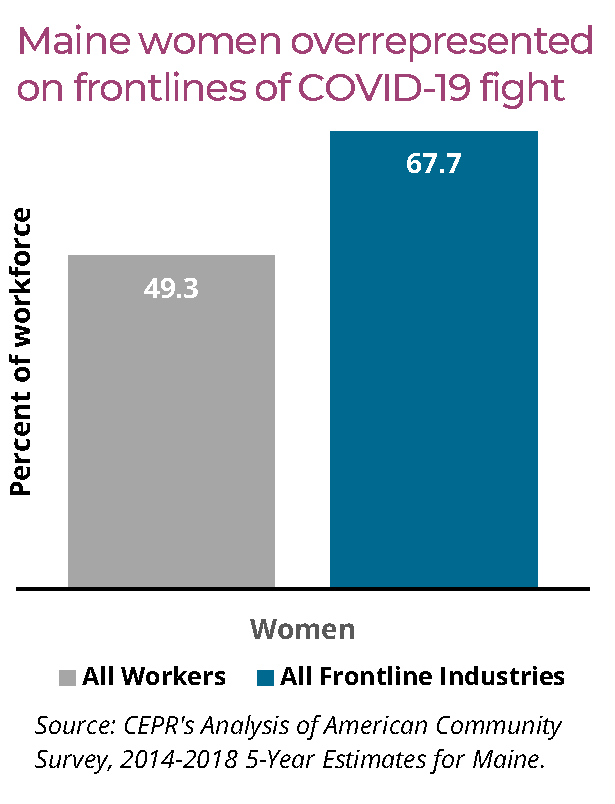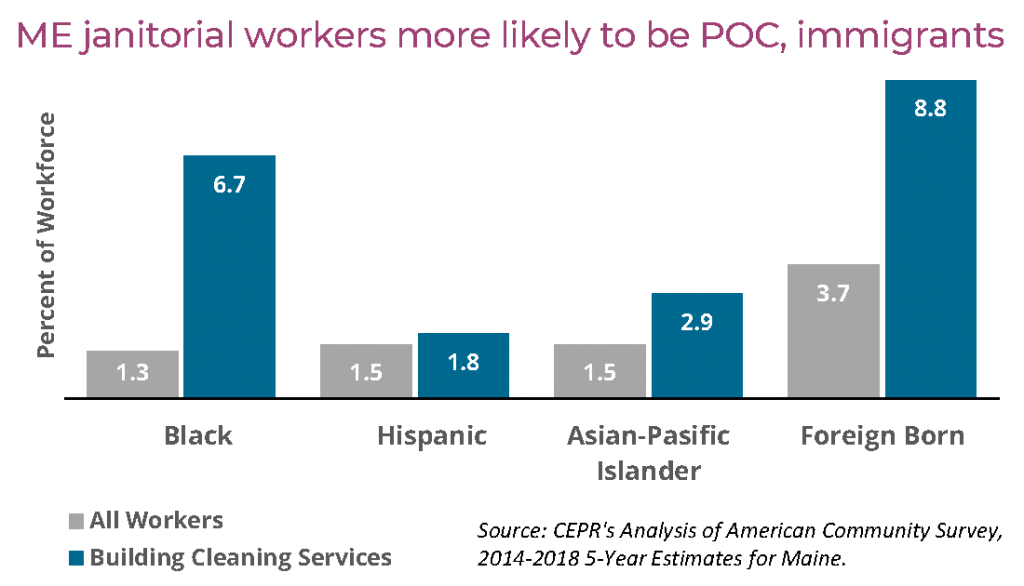As many sectors of the economy come to a halt, workers in essential service industries are still clocking in to ensure people are able to meet basic needs during the pandemic.
Recent analysis reveals that black workers, women, and immigrants are most likely to hold jobs on the frontline of the coronavirus fight. As a result, the policy response to protect and compensate frontline workers will have repercussions on how the pandemic and its economic effects break down across racial and gender lines.
A national analysis by the Center for Economic and Policy Research identified workers in six industries as essential during the pandemic. Those industries are:
- grocery, convenience, and drug stores
- public transit
- trucking, warehouse, and postal service
- building cleaning services
- health care
- childcare and social services.
In Maine, workers in these industries represent more than 160,000 workers — nearly one-quarter of the total workforce — making essential services a critical sector of our entire economy.
People of color, women are overrepresented in frontline industries
Frontline workers in Maine are disproportionately likely to be women and/or people of color, a disparity that’s particularly stark in the industry of building cleaning services.
- Wome
 n make up roughly 49 percent of the total Maine workforce, but comprise more than two-thirds (roughly 68 percent) of frontline workers.
n make up roughly 49 percent of the total Maine workforce, but comprise more than two-thirds (roughly 68 percent) of frontline workers. - Frontline workers are 31 percent more likely to be black workers, compared to the full workforce. Black workers comprise just 1.3 percent of the total workforce, but account for 1.7 percent of frontline workers. Asian-Pacific Islanders and immigrant workers are also over-represented in frontline industries.
- Building cleaning services workers are more than four times as likely to be Black workers compared to the full workforce and twice as likely to be immigrant workers.
Workers over 50 years old make up 39.3 percent of frontline workers. While these figures are in line with the representation of over-50 workers in the total workforce, it is still noteworthy. Workers in this age group are at greater risk for more serious health consequences if they become ill with COVID-19.
Frontline workers face unique economic challenges during the pandemic
Frontline workers are often paid less than other workers. On average, 21.5 percent of frontline workers live in low-income households (those earning less than 200 percent the poverty line) compared to 18.8 percent of the full workforce.
Low incomes add challenges to frontline workers’ ability to take time off, find last-minute childcare, and pay health care bills if they get sick.
When it comes to health insurance coverage and children in the home, frontline workers are more or less in line with workers in other industries. Roughly 9 percent do not have health insurance, and roughly one in three has a child or children in the home.
However, frontline workers face additional health care and economic risks not faced by those who are able to stay home. An employee at an essential business who lacks insurance, for example, faces greater potential health risks than other workers because of their daily exposure to the public. In the wake of statewide school closures, a frontline worker with children may face additional challenges and incur new costs to secure childcare, compared to workers able to stay home with their children.
As Mainers give thanks to the essential frontline workers who support the ability of others to safely shelter in place and receive health care as we need it, we should also call for policies to increase pay and improve working conditions for all frontline workers.
Increased pay, benefits will help protect frontline workers from coronavirus fallout
Income support is one way to ensure frontline workers have the resources they need to care for themselves and their families while doing the work that makes it possible for others to stay home. Senate Democrats have proposed a “Heroes Fund” to provide hazard pay to health care workers during the pandemic. Congress should expand the scope of its ambition to include other frontline workers as well.
Frontline workers also need access to health insurance, given that their work puts them at higher risk of contracting the coronavirus. At the least, Congress should immediately re-open the ACA exchanges for a special enrollment period, including federal subsidies, to allow uninsured workers on the frontlines to obtain coverage now.
The coronavirus has laid bare the pre-existing cracks in our system through which many workers were at risk of falling even before the pandemic. But COVID-19 shows how linked all of us are. Strengthening economic security for front line workers will recognize the critical role they play in our economy and leave them better equipped to face downturns in the future.


